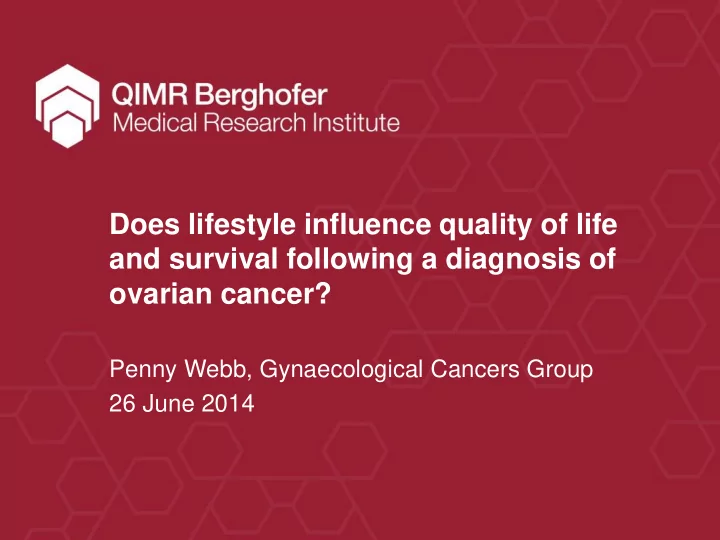

Does lifestyle influence quality of life and survival following a diagnosis of ovarian cancer? Penny Webb, Gynaecological Cancers Group 26 June 2014
Things that influence survival • Age, BRCA mutation status • Characteristics of the cancer – Subtype, grade, stage • Treatment – Surgery – Chemotherapy • Other things? – Genetics But women with similar cancers and identical treatment – Lifestyle: diet, vitamin supplements, smoking, exercise? can have very different outcomes – Body-size?
Hints from other cancers - lifestyle • Physical activity: – Many studies suggest exercise survival • Diet / body-size: – Mixed results in trials – Healthy diet lower inflammatory markers – Soy foods? • Alcohol: – Increases risk of developing breast cancer, effects on survival unclear
Hints from other cancers - medications • Aspirin – anti-inflammatory & blood thinning: – Aspirin reduces risk of some cancers – Suggestion from CHD trials that it may cancer mortality • Metformin – for diabetes: – Suggestions Metformin cancer survival in diabetics • Statins – for cholesterol-lowering: – Associated with prostate & breast cancer survival
Lifestyle & survival from ovarian cancer 1 .0 1.0 Pack-years smoking Vegetable consumption .9 (Stage III-IV) .8 0.8 .7 Cumulative Survival .6 0.6 .5 h ig h 0.4 .4 me di u m l ow .3 <10 years 0.2 .2 10-19 years 20-29 years .1 30+ years 0.0 0 .0 0 2 4 6 8 1 0 0.0 2.0 4.0 6.0 8.0 10.0 Survival time (years) Survi v al ti m e (ye ars) Nagle et al. CEBP 2006; IJC 2003
Obesity & ovarian cancer survival Study, Year HR (95% CI) HR (95% CI) Schildkraut 2000 1.10 (0.70, 1.70) 1.10 (0.70, 1.70) Nagle 2003 0.96 (0.74, 1.23) 0.96 (0.74, 1.23) Zhang 2005a 2.33 (1.12, 4.87) 2.33 (1.12, 4.87) Pavelka 2006 1.28 (1.03, 1.59) 1.28 (1.03, 1.59) Kjaerbye-Thygesen 2006 1.83 (1.38, 2.42) 1.83 (1.38, 2.42) Moysich 2007 0.99 (0.71, 1.38) 0.99 (0.71, 1.38) Li 2007 1.03 (0.78, 1.36) 1.03 (0.78, 1.36) Yang 2008 1.22 (0.86, 1.71) 1.22 (0.86, 1.71) Skirnisdottir 2008 1.73 (0.66, 4.52) 1.73 (0.66, 4.52) Schlumbrecht 2009 0.95 (0.68, 2.43) 0.95 (0.68, 2.43) Lamkin 2009 1.05 (1.01, 1.08) 1.05 (1.01, 1.08) Skirnisdottir 2010 0.94 (0.74, 1.21) 0.94 (0.74, 1.21) Dolecek 2010 1.20 (0.72, 1.98) 1.20 (0.72, 1.98) Zhou 2011a 1.30 (0.92, 1.83) 1.30 (0.92, 1.83) Schlumbrecht 2011 1.02 (0.43, 2.38) 1.02 (0.43, 2.38) Schlumbrecht 2011 2.53 (1.19, 5.38) 2.53 (1.19, 5.38) Overall (I-squared = 53.5%, p = 0.006) 1.17 (1.05, 1.31) BETTER WORSE .5 1 1 5 10 HR (95% CI) (log scale) Protani, Ca Prev Res 2012
Aims: 1. Identify whether lifestyle* after completion of primary treatment is associated with: – progression-free and overall survival – ‘quality of life’ ( QoL), insomnia 2. Identify whether lifestyle during chemotherapy is associated with: – prevalence and severity of side-effects – physical, functional and emotional wellbeing – chemotherapy completion rates *Lifestyle: diet & supplement use, physical activity, sedentary behaviour, smoking, alcohol consumption, medication use
Participants • Target: ~1000, recruited through participating centres – Currently N = 714 • Eligibility: – Australian residents, age 18-79 – Primary epithelial cancer of ovary, fallopian tube or peritoneum – Less than 9 months from diagnosis • Data & sample collection: – Questionnaire at diagnosis, 3, 6, 9, 12, & 24 (+ 36?) months – Blood sample at diagnosis & 12 months (not essential) – Clinical ‘checklist’ every 3 months from 6 months
Data collection • Ancestry and family history • Reproductive / hormonal history (brief) • Height & weight Baseline • Medical history / co-morbidities • Medications: – Aspirin, NSAIDs, metformin, statins, other meds • Lifestyle: – Smoking, physical activity, diet, supplements Follow-Up • Insomnia • Self-rated health • Quality of life, fatigue
Timeline 2012 2013 2014 2015 2016 Ethics Recruitment 6 Months 12 Months 24 Months
Thank you opalstudy.qimrberghofer.edu.au
Recommend
More recommend